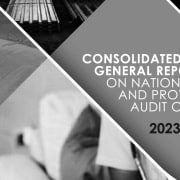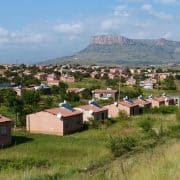|
Getting your Trinity Audio player ready...
|
Image: Flickr/GovernmentZA
Too slow.
That is how Auditor-General (AG) Tsakani Maluleke described the government’s response to the deadly floods of April 2022 that hit KwaZulu-Natal and the Eastern Cape. Presenting the first of a series of reports that will be produced by the Auditor-General of South Africa (Agsa) around this particular use of public money, Maluleke said that in times of disaster, the public looks to government for humanitarian relief, the restoration of services, the provision of housing, and the rebuilding of infrastructure.
All of these are well within government’s capabilities to provide. But the reality of its tardy response, Maluleke said, was that more than four months after the devastating natural disaster, “residents and businesses in affected areas continue to experience hardship”.
At the same time, she acknowledged the government’s ongoing initiatives of “successfully providing social relief and commencing the rehousing and rebuilding phases with some good practices emerging”. The AG identified those good practices as:
- The social relief system responded well to the disaster.
- The establishment and activation of national and provincial committees showed commitment by government to better coordinate, oversee and monitor the relief efforts and the use of funds.
- KwaZulu-Natal (KZN) implemented pre-audit processes to reduce the risk of procurement irregularities.
- Payments were withheld where Agsa identified poor-quality delivery or procurement risks to avoid losses.
However, not all delivery in critical areas took place at the required speed and quality, Maluleke said. “This disaster also again revealed the pre-existing weaknesses in intergovernmental processes and coordination. Regrettably, some of the weaknesses highlighted in this report were raised before on government’s covid-19 response and have not been dealt with since.”
This echoes what Corruption Watch cautioned back in April this year, when it said, “Lessons must be learned from the PPE debacle and the subsequent publication of Covid-19-related spending, which allowed those monitoring to pick up irregularities.”
The flood relief audit process scrutinised the following initiatives, up to 22 July 2022:
- Provision of mobile classrooms and kitchens to severely damaged schools in KZN,
- Provision of temporary residential units for KZN residents who lost their homes in the floods,
- Water tankering services in eThekwini Metro where damage to water infrastructure affected water supply,
- Repairs to government properties,
- Social relief efforts in KZN and the Eastern Cape.
The auditees were:
- KZN Department of Education
- KZN Department of Human Settlements
- Department of Water and Sanitation
- KZN Department of Cooperative Governance and Traditional Affairs
- eThekwini Metropolitan Municipality
- Property Management Trading Entity, a unit in the Department of Public Works
- South African Social Security Agency
Compromised control environment
The audit commenced in May 2022, focusing on procurement, contract management, and payments; economical, efficient and effective delivery of relief projects; and the effectiveness of monitoring and oversight.
That effectiveness was severely hindered by what the AG called auditees’ compromised control environments, and existing weaknesses in intergovernmental coordination.
The immediate areas for attention are:
- Where delivery is slow or compromised, leadership must take urgent action to alleviate the hardship of affected communities.
- Even in times of crisis, the quality of delivery and value for money should be non-negotiable.
- Preventative controls should be implemented to avoid failure, especially in the infrastructure rebuilding phase.
- Government should continue to build disaster management capacity and capabilities and learn from previous disasters.
Agsa found that because pre-existing control weaknesses had not been dealt with, the emergency only exacerbated them and as a result, the control environment was not robust enough to prevent failures.
Furthermore, there was a distinct lack of urgency in assessing damage and determining needs, particularly in the Eastern Cape. Here the inadequate response was caused by a backlog in assessing the impact of previous disasters dating back to 2013 – in some case assessments were not done at all. This nearly decade-long backlog arose because of lack of coordination between municipalities and provincial departments, and it caused delays in requests for funding submitted to the Eastern Cape Provincial Disaster Operations Centre for consideration. Maluleke stressed that this area needs urgent improvement.
The slow response in the Eastern Cape can be attributed to various factors, including:
- lack of capacity due to persistent vacancies and inadequate coordination to deal with the disaster process, as there were no dedicated officials within the provincial education, transport and health departments.
- departments and municipalities did not reprioritise funds to deal with the disaster to avoid compromising existing objectives.
- delays in the supply of material because of scarcity from service providers under high demand, bad terrain, and inclement weather conditions contributed to delays in the delivery of temporary residential units.
The slow response in KwaZulu-Natal was also caused by a number of factors, including:
- lack of capacity, inadequate project management, and ineffective monitoring to ensure that contractors completed projects on time and delivered quality goods and services.
- government was not adequately prepared for a disaster – despite clear knowledge that the province has suffered similar floods in the past. For example, documented processes were not always in place (such as for the supply of water tankering services) to guide and direct efforts to enable service delivery.
- Some challenges experienced during implementation (such as the unavailability of land for temporary residential units) also remain unresolved, resulting in current and future delivery failures.
With the exception of the social relief initiative, the interim measures of the initiatives relating to mobile units, temporary residential units, water tankering services and repairs to government properties had not been completed by 31 July 2022.
Some of the findings were similar to those previously reported on government’s covid-19 response, said the AG.
“Government’s priority should be to urgently strengthen its disaster management capacity and capabilities, as disasters such as these floods are becoming more common due to climate change.”
Bumbling effort to rebuild school
The government’s response to the Eastern Cape and KZN floods is encapsulated in one case study.
At Brettenwood High School in eThekwini, one of the five schools selected for auditing, the KZN education department determined that 13 mobile classrooms would be rebuilt, because the same number had been damaged by the flood.
However, says Maluleke, “the department did not take into account that these classrooms were on the ground floor of a three-storey building, which showed signs of damage to the foundation. This would likely affect the structural integrity of the whole building, including the classrooms on the first and second floors. This was also confirmed by a structural assessment report by the department in April 2022. Therefore, the needs assessment did not consider that the whole building accommodated 880 learners and that the 13 mobile classrooms could only accommodate up to 550 learners and would thus not be sufficient.”
In addition, four of the 13 mobile units installed and reported as complete were not in use when the auditors conducted a site inspection on 27 May 2022, because they were constructed on the very same ground previously submerged by the floods, and two units had to be vacated due to heavy rains on 21 and 22 May 2022
“As a result, the construction of the remaining nine mobile classrooms was placed on hold while the department investigated the availability of suitable land on the school premises not prone to flooding.”
The department has since confirmed to Agsa that the Development Bank of Southern Africa was appointed to undertake major repairs and renovation at the school to address the structural concerns.
Audit to continue
The public can expect further revelations from Agsa in the near future.
“Our audit will continue until we are satisfied with the progress made and with the responsiveness to our findings, after which we plan to integrate the audit work into our normal audits,” the AG explained.
If Agsa does not see the required action during its follow-ups, it will invoke its enforcement mandate if the matter meets the definition of a material irregularity. “This can result in remedial action; and if not implemented, a certificate of debt if a financial loss was suffered. We also refer any indication of fraud not dealt with appropriately to investigative agencies.”








